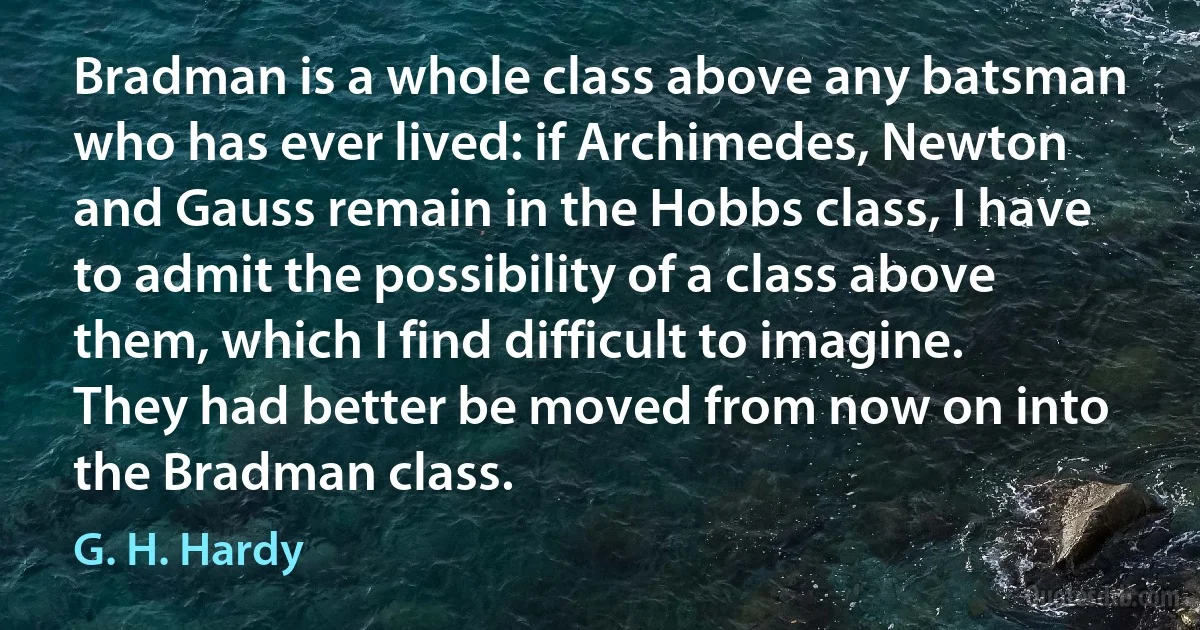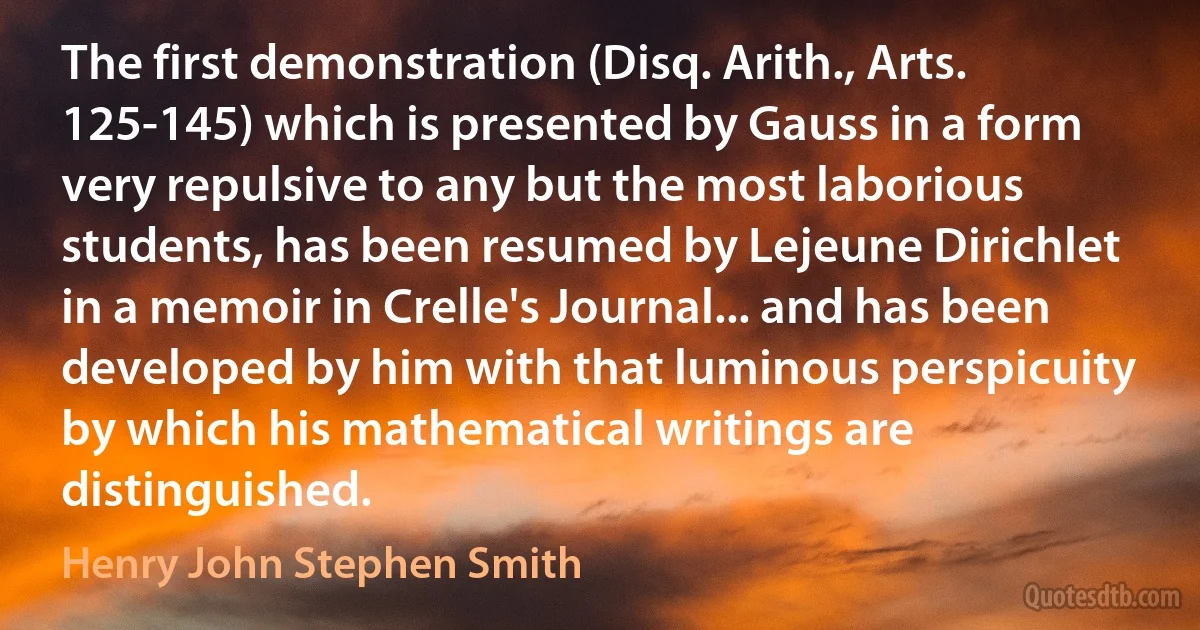Gauss Quotes
The analytical geometry of Descartes and the calculus of Newton and Leibniz have expanded into the marvelous mathematical method-more daring than anything that the history of philosophy records-of Lobachevsky and Riemann, Gauss and Sylvester. Indeed, mathematics, the indispensable tool of the sciences, defying the senses to follow its splendid flights, is demonstrating today, as it never has been demonstrated before, the supremacy of the pure reason.

Nicholas Murray Butler
In 1735 the solving of an astronomical problem, proposed by the Academy, for which several eminent mathematicians had demanded several months' time, was achieved in three days by Euler with aid of improved methods of his own... With still superior methods this same problem was solved by the illustrious Gauss in one hour.

Florian Cajori
My specific... object has been to contain, within the prescribed limits, the whole of the student's course, from the confines of elementary algebra and trigonometry, to the entrance of the highest works on mathematical physics. A learner who has a good knowledge of the subjects just named, and who can master the present treatise, taking up elementary works on conic sections, application of algebra to geometry, and the theory of equations, as he wants them, will, I am perfectly sure, find himself able to conquer the difficulties of anything he may meet with; and need not close any book of Laplace, Lagrange, Legendre, Poisson, Fourier, Cauchy, Gauss, Abel, Hindenburgh and his followers. or of any one of our English mathematicians, under the idea that it is too hard for him.

Augustus De Morgan
The really deep divergence between the humanistic and scientific sensibilities is one of temporality. Very nearly by definition, the scientist knows that tomorrow will be in advance of today. A twentieth-century schoolboy can manipulate mathematical and experimental concepts inaccessible to a Galileo or a Gauss. For a scientist the curve of the future is positive. Inevitably, the humanist looks back.

George Steiner
Measure-relations can only be studied in abstract notions of quantity, and their dependence on one another can only be represented by formulæ. On certain assumptions, however, they are decomposable into relations which, taken separately, are capable of geometric representation; and thus it becomes possible to express geometrically the calculated results. In this way, to come to solid ground, we cannot, it is true, avoid abstract considerations in our formulæ, but at least the results of calculation may subsequently be presented in a geometric form. The foundations of these two parts of the question are established in the celebrated memoir of Gauss, Disqusitiones generales circa superficies curvas.

Bernhard Riemann
The great masters of modern analysis are Lagrange, Laplace, and Gauss, who were contemporaries. It is interesting to note the marked contrast in their styles. Lagrange is perfect both in form and matter, he is careful to explain his procedure, and though his arguments are general they are easy to follow. Laplace on the other hand explains nothing, is indifferent to style, and, if satisfied that his results are correct, is content to leave them either with no proof or with a faulty one. Gauss is as exact and elegant as Lagrange, but even more difficult to follow than Laplace, for he removes every trace of the analysis by which he reached his results, and studies to give a proof which while rigorous shall be as concise and synthetical as possible.

W. W. Rouse Ball
The problem of the direct determination of the primitive roots of a prime number is one of the 'cruces' of the Theory of Numbers. Euler, who first observed the peculiarity of these numbers, has yet left us no rigorous proof of their existence; though assuming their existence, he succeeded in accurately determining their number. The defect in his demonstration was first supplied by Gauss, who has also proposed an indirect method for finding a primitive root.

Henry John Stephen Smith
MacUser: Which person do you most admire?
Jef Raskin: For what attribute? Once again you ask a question that linearises a complex matter. I can name many. Let's start with people named George: George Cantor for moving infinity out of philosophy into mathematics, George Washington for showing how a leader should relinquish power, and George Bernard Shaw for his humanity... Or we can do it by subject and admire Aristotle, Isaac Newton and Albert Einstein for their pulling from nature comprehensible laws; or Euclid, Gauss and Gödel for their contributions to mathematics; or people who have influenced me very directly, in which case I'd mention my very admirable parents and the teacher who taught me to be intellectually independent, L R Genise; or how about Claude Shannon without whose work on information theory I would have been lost.

Jef Raskin
The total subject of mathematics is clearly too broad for any one of us. I do not think that any mathematician since Gauss has covered it fully and uniformly, even Hilbert did not, and all of us are of considerably lesser width (quite apart from the question of depth) than Hilbert. It would therefore, be quite unrealistic not to admit, that any address I could possibly give would not be biased towards some areas in mathematics in which I have had some experience, to the detriment of others which may be equally or more important. To be specific, I could not avoid a bias towards those parts of analysis, logics, and certain border areas of the applications of mathematics to other sciences in which I have worked. If your Committee feels that an address which is affected by such imperfections still fits into the program of the Congress, and if the very generous confidence in my ability to deliver continues, I shall be glad to undertake it.

John von Neumann
If explaining minds seems harder than explaining songs, we should remember that sometimes enlarging problems makes them simpler! The theory of the roots of equations seemed hard for centuries within its little world of real numbers, but it suddenly seemed simple once Gauss exposed the larger world of so-called complex numbers. Similarly, music should make more sense once seen through listeners' minds.

Marvin Minsky
It is to Gauss, to the Magnetic Union, and to magnetic observers in general, that we owe our deliverance from that absurd method of estimating forces by a variable standard which prevailed so long even among men of science. It was Gauss who first based the practical measurement of magnetic force (and therefore of every other force) on those long established principles, which, though they are embodied in every dynamical equation, have been so generally set aside, that these very equations, though correctly given... are usually explained... by assuming, in addition to the variable standard of force, a variable, and therefore illegal, standard of mass.

Carl Friedrich Gauss
Maybe we have become so hung up on looking at the primes from Gauss's and Riemann's perspective that what we are missing is simply a different way to understand these enigmatic numbers. Gauss gave an estimate for the number of primes, Riemann predicted that the guess is at worst the square root of N off its mark, Littlewood showed that you can't do better than this. Maybe there is an alternative viewpoint that no one has found because we have become so culturally attached to the house that Gauss built.

Carl Friedrich Gauss


